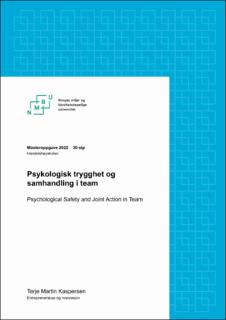| dc.contributor.advisor | Lynch, Matthew Patrick James | |
| dc.contributor.author | Kaspersen, Terje Martin | |
| dc.date.accessioned | 2022-12-12T08:42:13Z | |
| dc.date.available | 2022-12-12T08:42:13Z | |
| dc.date.issued | 2022 | |
| dc.identifier.uri | https://hdl.handle.net/11250/3037128 | |
| dc.description.abstract | Formålet med prosjektet har vært å tilnærme seg fenomenet samhandling i team. Bakgrunnen og problemområdet er ønske om økt bevissthet på hvordan samhandlingsprosesser er påvirket av psykologisk trygghet. Problemstillingen er: hvordan påvirker psykologisk trygghet samhandling i team som utfører strukturerte oppgaver under tidspress? Det er brukt et eksplorativt forskningsdesign som metode. Det er utviklet et eget forskningsinstrument til studien. Data er generert på Campus Ås med videoopptak av team som utfører «Lego Ditto». «Lego Ditto» er en strukturertoppgave innenfor en kort tidsperiode. Det er brukt spørreskjema for å måle psykologisk trygghet i team. I alt er det hentet data fra fem team. Data i denne studien er analysert med språkanalyse, opptellingsmetode og spørreundersøkelse. Problemområdet er belyst ved tre forskningsspørsmål som bidrar til oppklaring av problemstillingen. Studien viser tegn til, men ingen klare mønster av hvordan psykologisk trygghet påvirker samhandling i team i denne oppgaven. Problemstillingen undersøkt i en kontekst av en strukturert oppgave med en kort tidsperiode. | en_US |
| dc.description.abstract | The purpose of this project was to approach the phenomena psychological safety and joint actions in teams. The background and problem area of this thesis is to better get to know how joint action processes is triggered by psychological safety. Problem statement is how does psychological safety affect the joint action in teams who execute well-structured tasks under time pressure? An exploratory research design has been used as a method. A research instrument has been developed for the study. Data is generated on Campus Ås with video recordings of teams performing «Lego Ditto». «Lego Ditto» is a structured task within a short period of time. Questionnaires were used to measure psychological safety in teams. Data has been obtained from five teams in total. Data in this study were analysed with language analysis, counting method and questionnaire. The problem area is highlighted by three research questions that contribute to clarifying the problem. The study shows signs of, but no clear evidence of how psychological safety affects teamwork in this thesis. | en_US |
| dc.language.iso | nob | en_US |
| dc.publisher | Norwegian University of Life Sciences, Ås | en_US |
| dc.rights | Attribution-NonCommercial-NoDerivatives 4.0 Internasjonal | * |
| dc.rights.uri | http://creativecommons.org/licenses/by-nc-nd/4.0/deed.no | * |
| dc.subject | Psykologisk trygghet | en_US |
| dc.subject | Samhandling | en_US |
| dc.subject | Kommunikasjon | en_US |
| dc.subject | Psychological safety | en_US |
| dc.subject | Teamwork | en_US |
| dc.subject | Communication | en_US |
| dc.title | Psykologisk trygghet og samhandling i team | en_US |
| dc.title.alternative | Psychological safety and joint action in team | en_US |
| dc.type | Master thesis | en_US |
| dc.description.localcode | M-EI | en_US |

